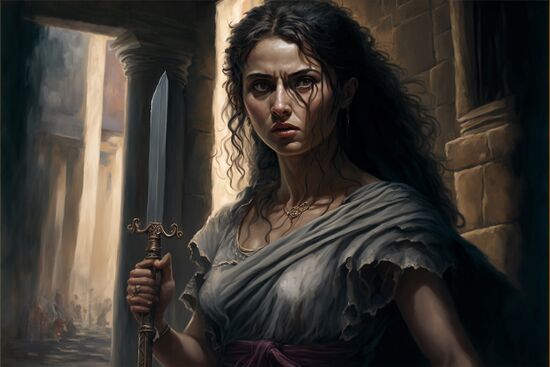The tragic hero is a central figure in Greek Tragedy and is typically a character of high status who possesses noble qualities but also has a tragic flaw or error in judgment that leads to their downfall. This concept is explored in great detail in Aristotle’s Poetics, one of the most influential works of literary criticism in Western literature.
According to Aristotle, the tragic hero has several key characteristics. First and foremost, the tragic hero is a person of high status, such as a king or queen, who is respected and admired by those around them. They possess great power and influence, and their actions have significant consequences for those around them. However, the tragic hero also has a tragic flaw, or hamartia, which is often a personality trait that leads to their downfall. This flaw may be hubris, or excessive pride, as in the case of Oedipus in Oedipus Rex, or a her pride in seeking revenge, as in the case of Medea in Euripides Medea.

Another characteristic of the tragic hero is their ability to make their own choices and decisions—or their free will. However, their actions are often influenced by their tragic flaw or by the workings of fate, and since the tragic hero is an important figure, like a king or noble (aristoi), their actions have significant consequences for others in addiction to themselves. The tragic hero is responsible for their own actions and must bear the consequences of their choices. They cannot blame their fate or their circumstances for their downfall. In addition, the tragic hero has moments of self-awareness or anagnorisis, where they realize the truth about their situation and their tragic flaw, but usually too late to change the course of events.
The tragic hero experiences great suffering and faces a tragic ending, such as death or exile. This suffering is an essential aspect of the genre, as it allows the audience to experience catharsis, or emotional release, through the experience of watching the play.
In Oedipus Rex, Oedipus is respected and admired by his people. However, his tragic flaw is his excessive pride, which leads him to ignore the warnings of the gods and pursue the truth about his past. As he uncovers the truth about his own actions and his relationship to the gods, he experiences a moment of self-awareness but is unable to escape his fate. In the end, he blinds himself and is exiled from his kingdom, suffering a tragic end.
In Medea, Medea is driven to seek revenge on her husband after he leaves her for another woman. Her tragic flaw is her desire for revenge, which leads her to commit terrible acts of violence, including the murder of her own children. Despite moments of self-awareness and regret, Medea is unable to escape the consequences of her actions and is left to suffer a tragic end, alone and exiled from her community.
Summary of the Characteristics of the Tragic Hero
The tragic hero is a central figure in Greek tragedy and is usually a character of high status, such as a king or queen, who possesses noble qualities but also has a tragic flaw or error in judgment that leads to their downfall. Here are some additional characteristics of the tragic hero:
- Nobility: The tragic hero is usually a person of high social standing, such as a king, queen, or noble. They are respected and admired by those around them and possess great power and influence. Because of their influence, their fall is all the more consequential.
- Tragic flaw: The tragic hero has a tragic flaw, or hamartia, which is often a personality trait that leads to their downfall. This flaw may be hubris, or excessive pride, as in the case of Oedipus in Oedipus Rex, or a desire for revenge, as in the case of Medea in Medea.
- Free will: The tragic hero has the ability to make their own choices and decisions, but their actions are often influenced by their tragic flaw or by the workings of fate.
- Responsibility: The tragic hero is responsible for their own actions and must bear the consequences of their choices. They cannot blame their fate, the gods, or their circumstances for their downfall.
- Self-awareness: The tragic hero often has moments of self-awareness or anagnorisis, where they realize the truth about their situation and their tragic flaw, but it is often too late to change the course of events.
- Suffering: The tragic hero experiences great suffering and often faces a tragic ending, such as death or exile.
These characteristics of the tragic hero are central to the genre of Greek tragedy and continue to influence modern literature and drama. By portraying characters who are flawed but still sympathetic, Greek tragedy challenges our understanding of human nature and the complexities of the human experience.
